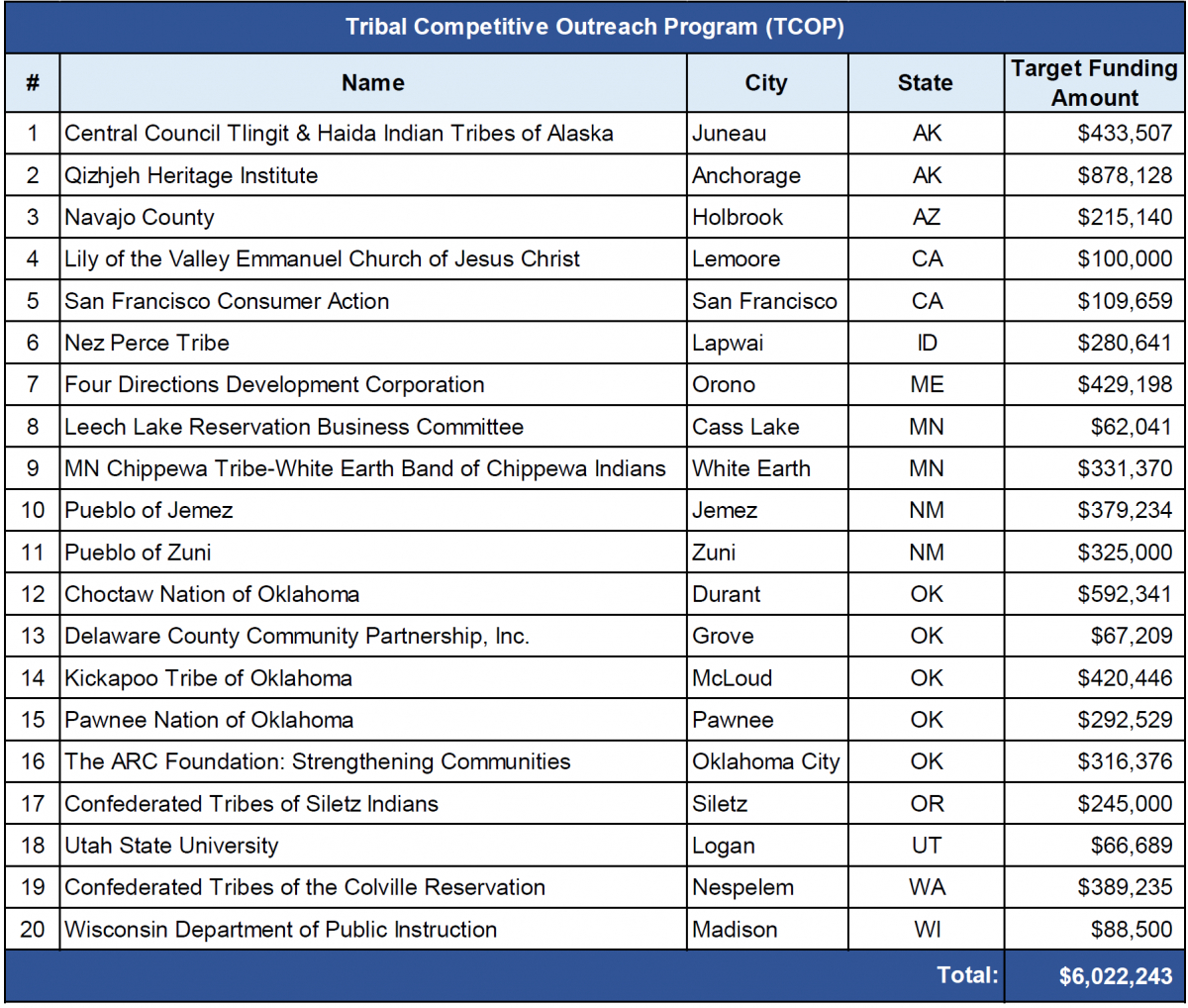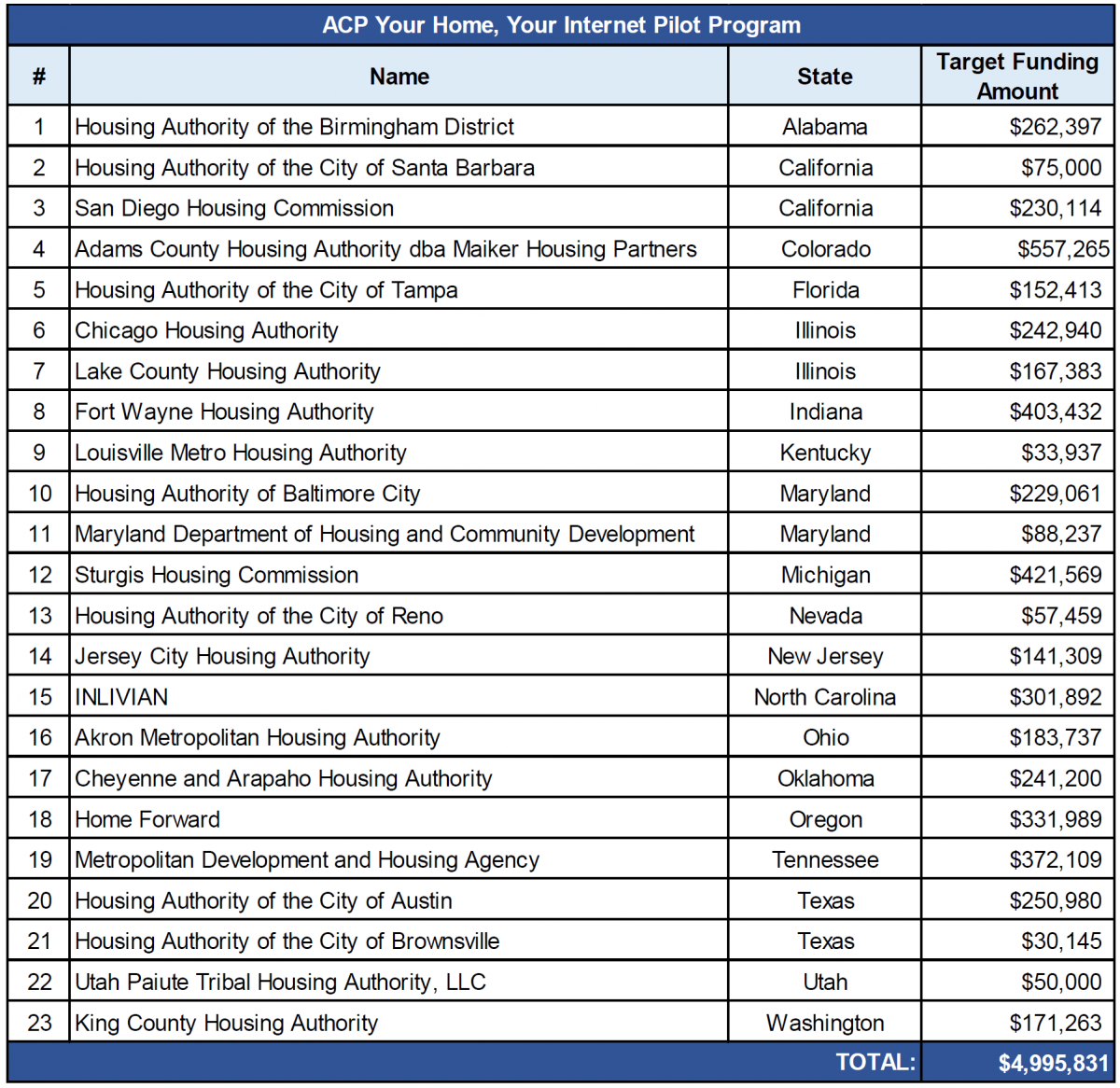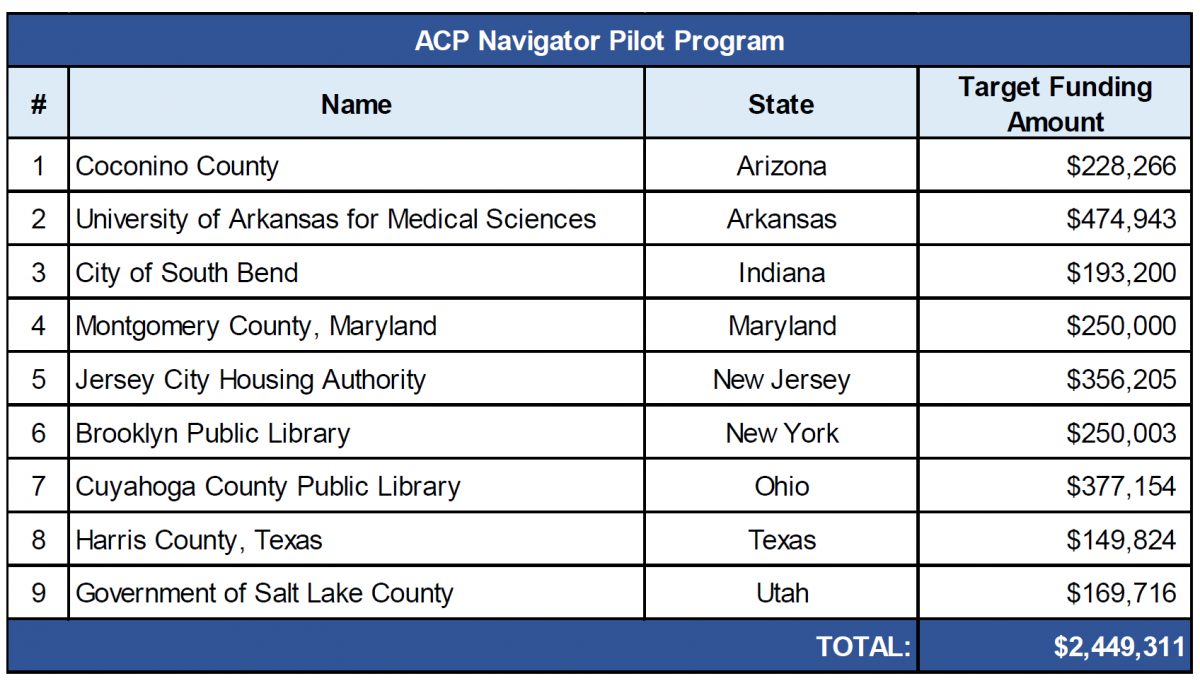FCC Plans Additional ACP Awareness Grants
Friday, March 24, 2023
Weekly Digest
FCC Plans Additional ACP Awareness Grants
You’re reading the Benton Institute for Broadband & Society’s Weekly Digest, a recap of the biggest (or most overlooked) broadband stories of the week. The digest is delivered via e-mail each Friday.
Round-Up for the Week of March 20-24, 2023

Half of all households eligible to participate in the Affordable Connectivity Program are unaware of the benefit. That's too many households. A January 2023 survey of low-income households found that 37 percent of eligible households that knew little about ACP said they would be likely to apply with more information and 31 percent said they would be likely to apply if they knew whether they qualified. Fortunately, the Federal Communications Commission continues efforts to raise awareness and enrollment in the program. Recently, the FCC announced $10 million in additional funding for trusted partners who will help sign people up to participate in the ACP.
Background
In the Infrastructure Investment and Jobs Act, Congress outlines three ways to help make eligible households aware of the Affordable Connectivity Program (ACP):
- Broadband providers that participate in the ACP must notify customers about the program, including how to enroll,
- For any federal program that qualifies a household for ACP, such as Medicaid or the Supplemental Nutrition Assistance Program (SNAP), the FCC must work with the agency that administers the program so participants are provided ACP info, and
- Congress authorized the FCC to conduct outreach efforts including consumer research, paid media campaigns, and grants to outreach partners.
On the second point, the FCC has engaged in extensive ACP outreach, including numerous speaking engagements and enrollment events, and has also coordinated with other federal agencies (Department of Education, the Department of Housing and Urban Development (HUD), and the Social Security Administration) on ACP outreach to eligible households participating in these agencies' qualifying government assistance programs.
And, last summer, the FCC established the Affordable Connectivity Outreach Grant Program to provide eligible governmental and non-governmental entities with the funding and resources needed to increase awareness of and participation in the ACP among those eligible households most in need of affordable connectivity. The objectives of the Affordable Connectivity Outreach Grant Program are to:
- Expand and support diverse and impactful outreach efforts nationwide;
- Strengthen outreach partners nationwide by empowering them to mobilize people and organizations to help raise awareness about the ACP; and
- Increase ACP enrollment as a result of ACP Outreach Grant Program-funded activities.
The Affordable Connectivity Outreach Grant Program is comprised of four complementary grant programs:
- The National Competitive Outreach Program, which funds outreach activities to increase awareness of and encourage participation in the ACP for eligible low-income households;
- The Tribal Competitive Outreach Program, which funds outreach activities to increase awareness of and encourage participation in the ACP for households on Tribal lands;
- The Your Home, Your Internet Pilot Program to increase ACP awareness specifically among recipients of federal housing assistance and to facilitate enrollment in the program by providing targeted assistance with the completion of the ACP application; and
- The ACP Navigator Pilot Program to grant trusted, neutral third-party entities (such as schools, school districts, or other local or state governmental entities) with access to the National Verifier for purposes of assisting customers with applying for the ACP.
ACP Awareness Grantees
To date, the FCC has announced grantees in all four ACP awareness programs.
National Competitive Outreach Program
On March 10, the FCC announced $60 million in grants in the National Competitive Outreach Program. Over 20 grantees will conduct multistate or national ACP outreach including Chicanos Por La Causa (Phoenix, AZ), San Francisco Consumer Action, Council for Opportunity in Education (Washington, DC), Multicultural Media Telecom and Internet Council (Washington, DC), Organization for Chinese Americans (Washington, DC), The Arc of the United States (Washington, DC), The Aspen Institute (Washington, DC), UnidosUS (Washington, DC), The Blackbottom Group (Talbotton, GA), Alianza Americas (Chicago, IL), CASA Inc (Hyattsville, MD), Goodwill (Rockville, MD), National Association for the Deaf (Silver Spring, MD), KC Digital Drive (Kansas City, MO), University of Mississippi (University, MS), Computers for People (Hoboken, NJ), National Urban League (New York, NY), Iris House (New York, NY), United Way of Greater Cincinnati (Cincinnati, OH), Urban League of Greater Southwestern Ohio (Cincinnati, OH), and Oregon Institute for a Better Way (Cottage Grove, OR).
Grantees will have a two-year performance period beginning when they accept their awards. [Grants to local or regional entities can be seen in separate lists here, here, here, and here.]
Tribal Competitive Outreach Program
Also on March 10, the FCC announced just over $6 million to 20 awardees in the Tribal Competitive Outreach Program.

Grantees will have a two-year performance period beginning when they accept their awards.
Your Home, Your Internet
On March 15, the FCC selected 23 applicants to receive grant funding with a combined funding total of $4,995,831 for the Your Home, Your Internet pilot program. The grantees have a one-year performance period.

ACP Navigators Pilot Program
Also on March 15, the FCC selected 9 applicants to receive grant funding with a combined funding total of $2,449,311 for the ACP Navigator Pilot Program. These grantees also have a one-year performance period.

Additional Funding Opportunity
On March 15, the FCC released an order creating a second round of funding for the National Competitive Outreach Grant Program and the Tribal Competitive Outreach Grant Program. Up to $10 million in grants, split evenly between the two programs, will come from: a) funding previously allocated to the Outreach Grant Program but not awarded and b) funding from the $100 million Affordable Connectivity Program outreach budget that the FCC had not yet allocated to specific outreach efforts.
The FCC's Consumer and Governmental Affairs Bureau will issue a Notice of Funding Opportunity (NOFO) to solicit applications for this additional funding opportunity. The NOFO will provide detailed information including the entities eligible for the funding, fundable expenses and activities, application and evaluation processes, reporting requirements, and other rules and requirements for the funding. The awardees listed above will not be eligible applicants for this new funding opportunity and the FCC hopes to expand the number of entities performing ACP outreach.
ACP Outreach Research
The January 2023 survey of low-income households conducted by Benton Senior Fellow John Horrigan, Oklahoma State University Professor Brian Whitacre, University of Southern California doctoral student Alejandro Alvarado Rojas, and USC Annenberg School for Communication Associate Professor Hernan Galpern offers guidance on how best to reach low-income households:
- Collaborate with trusted local institutions and communities. The survey found that respondents were likely to trust community anchor institutions such as libraries or churches for information about benefit programs. Among eligible households currently unaware of the ACP, 77% say they would trust information on this type of program if it came from a local community organization.
- Leverage participation in other social programs. Information coming from programs in which respondents already participate was also cited as highly trusted for learning about new benefit programs. Among eligible households currently unaware of the ACP, 80% say they would trust information on this type of program if it came from a benefits program they already participate in.
- Understand that outreach initiatives must be tailored to the needs of specific communities. The mode of outreach matters, as the survey found that respondents ranked emails and text messages at the top when asked what kind of outreach would elicit a response from them. TV and Web advertisements ranked lowest. However, these rankings varied by race, as White respondents said they were more likely to respond to email outreach than texts, while African-Americans displayed a preference for text messaging. Traditional mail could prove to be an effective outreach tool for Hispanic respondents, while local TV or radio spots may be better in African-American dominant communities.
- Integrate activities to promote ACP enrollment with digital equity planning. The link between digital skills and likelihood of successful ACP enrollment is an important finding for state and local decisionmakers. Past research has shown relationships between digital skills training and using the internet for education or job search, and this survey finds a similar association between digital skills and engaging with internet benefit programs. The payoff to investments in digital skills extends to enrolling in programs that can ease affordability pressures in addition to helping people use the internet to improve their lives.
Quick Bits
- ACP in Jeopardy But Has Overwhelming Bipartisan Support (Digital Progress Institute)
- What will BEAD mean for the poorest US communities? (Fierce)
- Senators Call for FCC to Update National Broadband Map Every Month (US Senate)
- Fights Over Rural America’s Phone Poles Slow Internet Rollout (Wall Street Journal)
Weekend Reads (resist tl;dr)
- Racial/ethnic and income disparities in neighborhood-level broadband access (Public Health)
- The Role of a Robust Broadband Infrastructure in Building Economic Resiliency During the COVID-19 Pandemic (Network On)
- Guide to New Broadband Funding for HUD-Assisted Communities (Department of Housing and Urban Development)
- Development of a National Spectrum Strategy (NTIA)
ICYMI from Benton
- Understanding and Driving Enrollment in the Affordable Connectivity Program
- Apply Now to Receive Support for Your ACP Outreach Efforts
- How You Can Partner With the FCC to Improve Broadband Adoption
- FCC Works to Increase Broadband Subscribership in Federal Housing
- It’s No Time to Disarm in the War Against the Digital Divide
- Affordable Connectivity Plan Enrollment and Digital Equity Planning
- 50 Ways the American Rescue Plan Act is Improving Internet Connectivity
- South Carolina's Bipartisan Efforts on the 'Next, Next Greatest Thing'
- Benton Institute for Broadband & Society Applauds FCC's Move Towards Phone Justice
Upcoming Events
Mar 28—America Connected (Total Telecom)
Mar 28—Precision Agriculture Connectivity Task Force Meeting (FCC)
Mar 28—The Free State Foundation's Fifteenth Annual Policy Conference
Mar 28—Precision Agriculture Connectivity Task Force Meeting (FCC)
Mar 28—Preserving Free Speech and Reining in Big Tech Censorship (House Commerce Committee)
Mar 28—Task Force to Prevent Digital Discrimination Listening Session (FCC)
Mar 29—Internet for All Washington: Kick-off Event Webinar (Washington State Office of Broadband)
Mar 30—Oregon Broadband Advisory Council (Oregon Broadband Office)
Mar 30—National Spectrum Strategy Listening Session (NTIA)
Apr 6—What Are the Consequences of Backdoors for Online Privacy? (Center for Data Innovation)
Apr 11—National Spectrum Strategy Listening Session (NTIA)
Apr 19—2023 BEAD Success Summit (Telecommunications Industry Association)
Apr 19—Colorado Broadband Summit (Colorado Broadband Office)
The Benton Institute for Broadband & Society is a non-profit organization dedicated to ensuring that all people in the U.S. have access to competitive, High-Performance Broadband regardless of where they live or who they are. We believe communication policy - rooted in the values of access, equity, and diversity - has the power to deliver new opportunities and strengthen communities.
© Benton Institute for Broadband & Society 2023. Redistribution of this email publication - both internally and externally - is encouraged if it includes this copyright statement.
For subscribe/unsubscribe info, please email headlinesATbentonDOTorg






